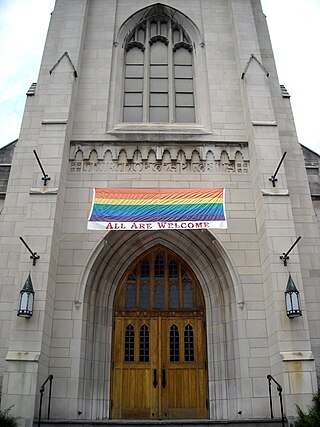Evangelicalism, also called evangelical Christianity or evangelical Protestantism, is a worldwide interdenominational movement within Protestant Christianity that emphasizes the centrality of sharing the "good news" of Christianity, being "born again" in which an individual experiences personal conversion, as authoritatively guided by the Bible, God's revelation to humanity. The word evangelic comes from the Greek word for 'good news'.

Fundamentalism is a tendency among certain groups and individuals that is characterized by the application of a strict literal interpretation to scriptures, dogmas, or ideologies, along with a strong belief in the importance of distinguishing one's ingroup and outgroup, which leads to an emphasis on some conception of "purity", and a desire to return to a previous ideal from which advocates believe members have strayed. The term is usually used in the context of religion to indicate an unwavering attachment to a set of irreducible beliefs.
The Christian right, otherwise referred to as the religious right, are Christian political factions characterized by their strong support of socially conservative and traditionalist policies. Christian conservatives seek to influence politics and public policy with their interpretation of the teachings of Christianity.
Christian fundamentalism, also known as fundamental Christianity or fundamentalist Christianity, is a religious movement emphasizing biblical literalism. In its modern form, it began in the late 19th and early 20th centuries among British and American Protestants as a reaction to theological liberalism and cultural modernism. Fundamentalists argued that 19th-century modernist theologians had misunderstood or rejected certain doctrines, especially biblical inerrancy, which they considered the fundamentals of the Christian faith.
Islamic fundamentalism has been defined as a revivalist and reform movement of Muslims who aim to return to the founding scriptures of Islam. The term has been used interchangeably with similar terms such as Islamism, Islamic revivalism, Qutbism, Islamic activism, but also criticized as pejorative, a term used by outsiders who instead ought to be using more positive terms such as Islamic activism or Islamic revivalism.
Jewish fundamentalism refers to fundamentalism in the context of Judaism. The term fundamentalism was originally used in reference to Christian fundamentalism, a Protestant movement which emphasizes a belief in biblical literalism. Today, it is commonly used in reference to movements that oppose modernist, liberal, and ecumenical tendencies within societies as well as modernist, liberal and ecumenical tendencies within specific religions and it is often coupled with extremist ideologies and/or political movements. The use of this definition is important in a Jewish context because the two movements which are most commonly associated with Jewish fundamentalism, Religious Zionism and Haredi Judaism, stray far from biblical literalism due to the importance of the Oral Law within Judaism. In fact, Karaism, the Jewish movement which is well-known due to its emphasis on biblical literalism, is rarely considered fundamentalist.

In politics, integralism, integrationism or integrism is an interpretation of Catholic social teaching that argues the principle that the Catholic faith should be the basis of public law and public policy within civil society, wherever the preponderance of Catholics within that society makes this possible. Integralism is anti-pluralist, seeking the Catholic faith to be dominant in civil and religious matters. Integralists uphold the 1864 definition of Pope Pius IX in Quanta cura that the religious neutrality of the civil power cannot be embraced as an ideal situation and the doctrine of Leo XIII in Immortale Dei on the religious obligations of states. In December 1965, the Second Vatican Council approved and Pope Paul VI promulgated the document Dignitatis humanae–the Council's "Declaration on Religious Freedom"–which states that it "leaves untouched traditional Catholic doctrine on the moral duty of men and societies toward the true religion and toward the one Church of Christ". However, they have simultaneously declared "that the human person has a right to religious freedom," a move that some traditionalist Catholics such as Archbishop Marcel Lefebvre, the founder of the Society of St. Pius X, have argued is at odds with previous doctrinal pronouncements.
The Christian left is a range of Christian political and social movements that largely embrace social justice principles and uphold a social doctrine or social gospel based on their interpretation of the teachings of Christianity. Given the inherent diversity in international political thought, the term Christian left can have different meanings and applications in different countries. While there is much overlap, the Christian left is distinct from liberal Christianity, meaning not all Christian leftists are liberal Christians and vice versa.
The English word militant is both an adjective and a noun, and it is generally used to mean vigorously active, combative and/or aggressive, especially in support of a cause, as in "militant reformers". It comes from the 15th century Latin "militare" meaning "to serve as a soldier". The related modern concept of the militia as a defensive organization against invaders grew out of the Anglo-Saxon fyrd. In times of crisis, the militiaman left his civilian duties and became a soldier until the emergency was over, when he returned to his civilian occupation.

Progressive Christianity represents a postmodern theological approach, which developed out of the liberal Christianity of the modern era, itself rooted in the Enlightenment's thinking. Progressive Christianity is a postliberal theological movement within Christianity that, in the words of Reverend Roger Wolsey, "seeks to reform the faith via the insights of post-modernism and a reclaiming of the truth beyond the verifiable historicity and factuality of the passages in the Bible by affirming the truths within the stories that may not have actually happened."
Dominion theology, also known as dominionism, is a group of Christian political ideologies that seek to institute a nation governed by Christians and based on their understandings of biblical law. Extents of rule and ways of acquiring governing authority are varied. For example, dominion theology can include theonomy but does not necessarily involve advocacy of adherence to the Mosaic Law as the basis of government. The label is primarily applied to groups of Christians in the United States.
The anti-cult movement, abbreviated ACM and also known as the countercult movement, consists of various governmental and non-governmental organizations and individuals that seek to raise awareness of cults, uncover coercive practices used to attract and retain members, and help those who have become involved with harmful cult practices.

Anson David Shupe, Jr. was an American sociologist and author noted for his studies of religious groups and their countermovements, family violence and clergy misconduct.
Jeffrey K. Hadden (1937–2003) was an American professor of sociology. He began his teaching career at Western Reserve University and then at the University of Virginia commencing in 1972. Hadden earned his Ph.D. in 1963 at the University of Wisconsin–Madison, where he was trained as a demographer and human ecologist.
Conservative Christianity, also known as conservative theology, theological conservatism, traditional Christianity, or biblical orthodoxy is a grouping of overlapping and denominationally diverse theological movements within Christianity that seeks to retain the orthodox and long-standing traditions and beliefs of Christianity. It is contrasted with Liberal Christianity and Progressive Christianity, which are seen as heretical heterodoxies by theological conservatives. Conservative Christianity should not be mistaken as being necessarily synonymous with the political philosophy of conservatism, nor the Christian right.
Christian nationalism is a form of religious nationalism that is affiliated with Christianity. It primarily focuses on the internal politics of society, such as legislating civil and criminal laws that reflect its adherents' view of Christianity and the role of religion in political and social life.
Religious liberalism is a conception of religion which emphasizes personal and group liberty and rationality. It is an attitude towards one's own religion which contrasts with a traditionalist or orthodox approach, and it is directly opposed by trends of religious fundamentalism. It is related to religious liberty, which is the tolerance of different religious beliefs and practices, but not all promoters of religious liberty are in favor of religious liberalism, and vice versa.

In the United States, evangelicalism is a movement among Protestant Christians who believe in the necessity of being born again, emphasize the importance of evangelism, and affirm traditional Protestant teachings on the authority as well as the historicity of the Bible. Comprising nearly a quarter of the U.S. population, evangelicals are a diverse group drawn from a variety of denominational backgrounds, including Baptist, Lutheran, Mennonite, Methodist, Pentecostal, Plymouth Brethren, Quaker, Reformed and nondenominational churches.



